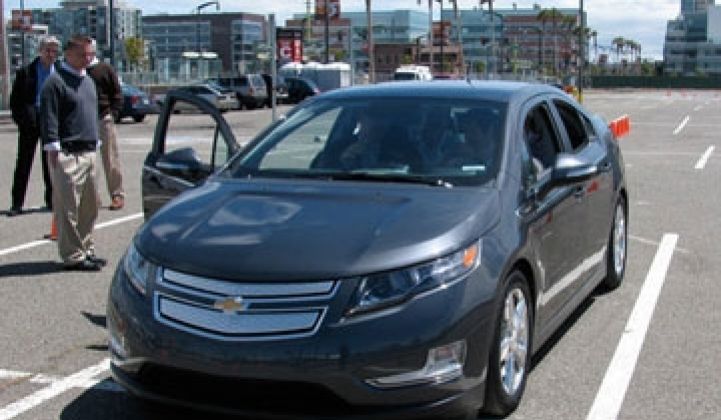When the Prius launched in 1997, a new term was born in the auto industry: the "halo car". Although Toyota lost money on the hybrid in its first few years, the company earned a favorable impression from consumers -- even those who didn't buy a Prius -- for its eco-leadership. Many people think of the upcoming Chevy Volt, GM's first mass production electric vehicle, as its version of a halo car. It's my opinion that GM is more interested in the Volt as a "helium car" than as a halo car.
By helium car, I mean a car whose express purpose is to raise the overall mileage number of a particular carmaker's fleet. GM will be able to sell more low-MPG SUVs and pickup trucks without being in violation of the CAFE regulations, thanks to the helium effect of the Volt. In other words, the Volt's primary purpose in the minds of GM's executives is to subsidize gas guzzlers.
In a recent insightful posting at gm-volt.com (a blog dedicated to covering the development and rollout of the Chevy Volt), GM's vehicle line director for the Volt, Tony Posawatz, revealed that GM is not very serious about making the Volt a popular success. "I think we will always want to keep the Volt in a position where demand for the product is slightly greater than supply...We would not want to see the Volt needing to be discounted for whatever reason." As a result, GM plans to make only a few hundred Volts in 2010, a few thousand in 2011 and about 60,000 in 2012. Those aren't the production numbers needed to make the Chevy Volt a mass-market success. A typical new car launch is measured in the hundreds of thousands of cars produced in the first few years. But for helium purposes, only a few thousand Volts need to be sold, thanks to expectations that its government-certified MPG numbers (which haven't been released yet, but will probably top 100 MPG) will be extremely favorable. For every Volt sold, GM will be able to sell a half-dozen Silverados and Sequoias, while still meeting the new CAFE rule of having an overall fleet MPG rating of 35 MPG. Contrast this to Nissan's ambitious plans to make more than a half-million Leafs in 2012. As part of that strategy, Nissan set the Leaf in the U.S. market at a very low price point: $32,500. Subtract the federal tax credit ($7,500), and the Leaf is comparable in price to the gasoline-powered Nissan Sentra.
How is Nissan able to make an EV that is priced so low? First of all, they've cracked the code for making lithium-ion batteries cheaply. The 24 kWh battery pack for the Leaf is rumored to cost about $9,000 (that's less than $400/kWh). The Volt's smaller battery pack (16 kWh), made by LG Chem, is rumored to cost about $700/kWh.
However, there's another element to Nissan's pricing strategy: It is willing to lower the price of the car in order to boost demand for it.
GM hasn't announced the price at which it will be selling the Volt yet -- it will do so later this summer -- but based on inferences from GM officials, it's clear that it will be priced much higher than the Leaf, and will probably be more comparable to a Cadillac than a Malibu. GM clearly doesn't see the Volt as a revolutionary new way to produce and sell cars. Instead, it sees a niche product and an opportunity to make money off of gullible tree-huggers. All of this is a tremendous shame. GM's 2007 decision to pursue the development of the Volt at great cost and controversy was a bold and courageous move -- indeed, it was GM's best shot at re-engineering the entire company from the car up. Instead, senior management has taken the golden apple presented by the company's engineers -- and what is by all accounts a spectacular car -- and turned it into a way to build more SUVs and con a few thousand eco-conscious buyers out of their money by charging a premium. GM is missing out on the opportunity to build a new company with a competitive flagship brand. Of course, there's still the chance that GM will price the Volt to be competitive with the Leaf (I would suggest that it deserves a slight premium of about $1,000 for the internal combustion range extender). So if GM prices the Volt at $33,500, I'll gladly eat my radiator hose.
***
Sam Jaffe is research manager, distributed energy strategies, for IDC Energy Insights. Among his areas of coverage are electric vehicles and their impact on the grid.



